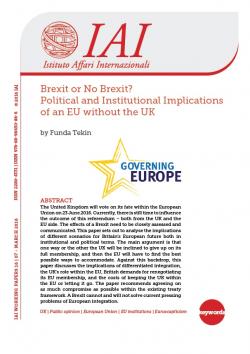Brexit or No Brexit? Political and Institutional Implications of an EU without the UK
The United Kingdom will vote on its fate within the European Union on 23 June 2016. Currently, there is still time to influence the outcome of this referendum – both from the UK and the EU side. The effects of a Brexit need to be closely assessed and communicated. This paper sets out to analyse the implications of different scenarios for Britain’s European future both in institutional and political terms. The main argument is that one way or the other the UK will be inclined to give up on its full membership, and then the EU will have to find the best possible ways to accommodate. Against this backdrop, this paper discusses the implications of differentiated integration, the UK’s role within the EU, British demands for renegotiating its EU membership, and the costs of keeping the UK within the EU or letting it go. The paper recommends agreeing on as much compromise as possible within the existing treaty framework. A Brexit cannot and will not solve current pressing problems of European integration.
Paper prepared within the context of “Governing Europe”, a joint project led by the Istituto Affari Internazionali (IAI) and Centro Studi sul Federalismo (CSF) of Turin in the framework of the strategic partnership with Compagnia di San Paolo, International Affairs Programme. Publ. in: Lorenzo Vai, Pier Domenico Tortola, Nicoletta Pirozzi (eds.), Governing Europe. How to Make the EU More Efficient and Democratic, Bruxelles [etc], P.I.E-Peter Lang, 2017, 248 p. (Federalism ; 8), ISBN 978-2-8076-0058-4 (pbk); 978-2-8076-0059-1 (pdf); 978-2-8076-0060-7 (EPUB); DOI: 10.3726/b10699.
-
Details
Roma, IAI, March 2016, 23 p. -
Issue
16|07 -
ISBN/ISSN/DOI:
978-88-98650-86-6
Introduction
1. Differentiation as a trademark of European integration – Is Brexit a big deal?
2. The United Kingdom in the EU – Troublemaker in the classroom?
2.1 The traditionally tricky “British question”
2.2 The champion or lone wolf of differentiated integration?
3. Brexit or non-Brexit – in any case the end of business as usual
3.1 Non-Brexit: new conditions for British membership in the EU
3.2 Brexit: Goodbye to yesterday
4. There is no such thing as a free exit: scenarios and their implications
4.1 Brexit or non-Brexit: institutional implications
4.2 Brexit or non-Brexit: political implications
Conclusions
References
Topic
Tag
Related content
-
Ricerca27/01/2015
Governing Europe
leggi tutto



